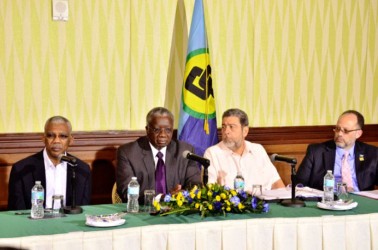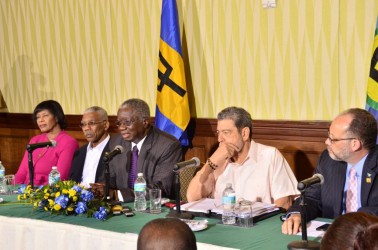CARICOM yesterday called on Venezuela to withdraw those elements of its controversial maritime decree that apply to the territory and waters of Guyana and other CARICOM member countries but there was no forthright condemnation which analysts see as a balancing act due to Caracas’s PetroCaribe fund and other aid facilities.
In the aftermath of the May 26th decree – Guyana’s independence anniversary – which sought to appropriate the lion’s share of this country’s Atlantic waters in a continuation of a decades-old policy, Georgetown had said publicly that it was expecting a strong response from Caricom. Yesterday’s statement following its July 2-4 Heads of Government meeting will be seen as tepid and a reflection of the realpolitik of the special relationships between Venezuela and some CARICOM states such as the economically-challenged Dominica.

At a press conference on Saturday following the end of the summit, the Ministry of the Presidency here said that the new Chairman of CARICOM, Prime Minister of Barbados, Freundel Stuart had said that the regional body stood in solidarity with Guyana as it relates to its border controversy with Venezuela.
As a founding member of CARICOM, Guyana has counted on the regional body since 1973 to ensure the inviolability of its territorial integrity and had firmly denounced the decree at various fora notably at the first session of the 11th Parliament on June 10th and in President David Granger’s inaugural address to CARICOM Heads on July 2nd. Yesterday’s statement from CARICOM began with an invocation of the longstanding friendship between Venezuela and the regional body.
It said that CARICOM Heads of State and Government reaffirmed the “longstanding, deep and wide-ranging friendship between CARICOM and the Bolivarian Republic of Venezuela” and recalled the many “agreements in the area of trade, investment, tourism and people-to-people contacts which bind the Governments and peoples of CARICOM and Venezuela together”.
The statement said that the Heads discussed Decree No: 1.787 in detail and “noted in particular the negative implications which the Decree has for the peace, security and development of the Cooperative Republic of Guyana.”
The statement said that the Heads recalled that on 8th September 2014, Gaston Browne, Prime Minister of Antigua and Barbuda, in his capacity as Chairman of CARICOM, had written to Venezuelan President Nicolás Maduro Moros, encouraging Venezuela to redouble its efforts at an early delimitation of the maritime boundary between Guyana and Venezuela. The statement added that Browne had also encouraged Caracas to assist in the finding of an early solution to the controversy from the Venezuelan contention that the Arbitral Award of 3rd October 1899 that established the boundary with Guyana, is null and void.

Browne’s letter would have come in the wake of Guyana’s complaints that Caracas had seized in this country’s waters, a research vessel that was connected to US oil explorer Anadarko in October 2013 and had failed to conduct promised meetings on maritime delimitation.
Yesterday’s statement said that the Heads “reaffirmed the inviolability of international treaties, agreements, awards and legal instruments and made particular reference to those international legally binding instruments that establish international boundaries.
Heads of Government further noted the negative implications of the decree for several other CARICOM countries.”
With respect to the implications for other countries both Granger and Guyana’s Foreign Minister Carl Greenidge had warned of the impact of the maritime decree on other states including Antigua and Suriname to the east. Suriname has also lodged a formal objection with Caracas over the matter.
Adherence
The Heads in the statement urged “adherence to accepted principles of international law in relation to the delineation and delimitation of the Exclusive Economic Zone and Continental Shelf in the region. CARICOM states do not accept any unilateral proclamation which is inconsistent with international law.”
They Heads also affirmed that CARICOM states have legitimate territorial and maritime entitlements that cohere with international law and which must be respected.
As a result of these concerns, the statement noted that a delegation of Heads met with the Vice President Jorge Alberto Arreaza and Foreign Minister of Venezuela to state the Community’s grave concern about Decree 1.787.
“Heads of Government therefore call upon the Government of the Bolivarian Republic of Venezuela, in the spirit of friendship and cooperation, to withdraw those elements of Decree 1.787 insofar as they apply to the territory and maritime space of CARICOM States”, the statement added.
Maduro had been expected to attend the summit on Friday but later pulled out without explanation. Granger’s address a day earlier had laid out Guyana’s case against Venezuelan aggression and sought to mobilise CARICOM backing.
Venezuela’s maritime decree came days after US oil giant ExxonMobil confirmed that it had discovered what is believed to be a large oil deposit off the coast of Demerara. Venezuela has for decades tried to stymie oil exploration on and offshore of Guyana since it began challenging in 1962 the 1899 arbitral award which is recognised internationally as a full, final and perfect settlement of the boundaries between the two countries.
Ratcheted up
Guyana has ratcheted up pressure on Venezuela in recent months over its interfering with oil explorers and said that the issuing of the decree constituted an end to the UN Good Officer process to find a settlement to the border controversy and that this country would now move for a juridical settlement. UN Secretary General Ban Ki-moon who was in Barbados for the CARICOM summit said that he would dispatching missions here and to Caracas to review the way forward.
In its statement yesterday on the Saturday press conference, the Ministry of the Presidency reported that Stuart said that CARICOM will do everything in its power to ensure that Venezuela “plays by the rules”.
Stuart was reported as saying that while the territorial controversy between Guyana and Venezuela is not new, CARICOM will do all that it can to ensure that peace and tranquillity is maintained in the region. He said both countries are committed to a process and it is the Caribbean Community’s hope that the process will “work itself out”.
Analysts noted that while the territorial controversy is not new, the May 26th Maritime Decree was entirely new and sufficiently distinct for CARICOM to have taken a stronger position on it.
“What one has to aim for, as the (controversy) continues, is a cooling of tempers. We do not think that there can be any compromise so far as Guyana’s territorial border is concerned. It is part of a process and that process has to work itself out”, Stuart was reported by the Ministry of the Presidency as saying.
The Barbados PM reiterated that given the fact that Guyana is an original signatory to the Treaty of Chaguaramas, CAIRCOM has to stand firmly behind Guyana even as it tries to maintain a good relationship with Venezuela.
In this light, the Ministry of the Presidency reported Stuart as saying that CARICOM was not prepared to pollute in any way their good relations between other CARICOM member states and Venezuela. He said thus far both Guyana and Venezuela have committed to maintaining peace and the scope exists for an amicable resolution to the row. Going forward, Prime Minister Stuart said as reported by the Ministry of the Presidency, “We have to make sure that the situation does not spin out of control and ensure that level heads are held on both sides”.
Granger, in response to questions at that press conference about what message he will be taking back to the Guyanese people on the issue, said he will assure them of CARICOM’s support and their commitment for maintaining peace.
In his address to the Heads on Thursday, Granger declared that gunboat diplomacy had no place in the 21st Century Caribbean and also hitched Guyana’s fate to the rest of Caricom warning that Venezuela’s hegemonic actions threatened an arc in the region stretching to its easternmost member Suriname.
He traced decades of Venezuela’s undermining of Guyana’s development in advancing its claim to the county of Essequibo despite the 1899 arbitral award which settled the matter.
Brunt
“Guyana has borne the brunt of having funding for a major hydro-electricity project blocked; of having investors intimidated; of having its citizens in border areas harassed and of having petroleum exploration vessels expelled and seized by gunboats.
“Guyana’s border with Venezuela was fixed …116 years ago. It was determined, defined, delineated and demarcated by international arbitration. Maps were drawn. Atlases were adjusted. Border markers were cast in stone. Any state that systematically, cynically and sedulously seeks to repudiate solemn international agreements and to undermine the security and sovereignty of another state must be condemned. Our national boundaries have been recognised internationally.
“Venezuela over the past 50 years, alas, has become regressive and even more aggressive. That country continues to threaten the development of Guyana, a CARICOM member state, both on land and at sea. That country, mindful, of its superior wealth and military and naval strength – and unmindful of the plight of the poor people of one of the world’s smallest and least populated states – has again resorted to intimidation and the threat of the use of force”, Granger, a historian, declared.
He added “Guyana seeks the support of its sister states in the Caribbean Community. We clamour for the succour of the Commonwealth. We yearn for the security of the United Nations and the shelter of international law to bring a peaceful end to Venezuela’s rejection of the validity of a boundary which has been defined as a ‘full, perfect and final’ settlement and which all parties, at that time, vowed to accept and respect for all time.”
Granger also declared that the region’s maritime zones are of economic and strategic importance.
“These waters are our common patrimony; they are ours to possess, ours to protect, ours to bequeath to posterity. We must remove any potential sources of conflict among our member states by ensuring the process of maritime delimitation in accordance with the international Law of the Sea.
“We must be prepared also to exercise absolute sovereignty over our maritime waters and resources. We must protect these resources from being invaded and annexed. We must pursue the principle of collective security which provides that a threat to any of our members represents a threat to our entire community”, Granger said.
“Guyana faces such a threat. Decree No 1.787, promulgated by the Bolivarian Republic of Venezuela, was timed to coincide with Guyana’s Independence Day on 26th May and the actual day of my inauguration as President of my country. The Decree lays claim to much of the coastline and most of the exclusive economic zone of Guyana. This Decree has dire implications for the entire Region but most particularly, the eastern tier of states – Barbados, Grenada, Guyana, Suriname and Trinidad and Tobago.
“We consider the issuance of the Decree by Venezuela as an act of aggression against Guyana’s sovereignty. It is an assault on our right to access and to develop our maritime resources. We ask this Conference to affirm its solidarity with Guyana to repudiate this Decree”, he urged.



